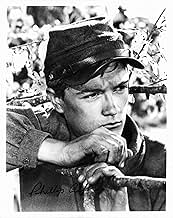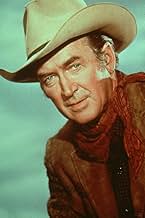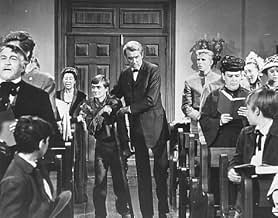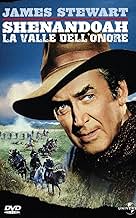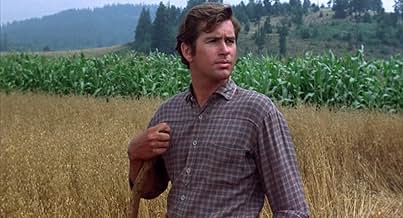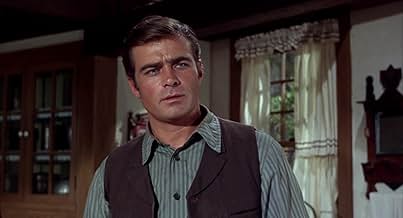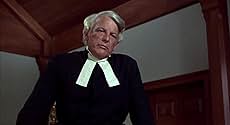Ajouter une intrigue dans votre langueA Virginia farmer who has vowed to remain neutral during the Civil War is spurred into action when his youngest son is taken by Union soldiers.A Virginia farmer who has vowed to remain neutral during the Civil War is spurred into action when his youngest son is taken by Union soldiers.A Virginia farmer who has vowed to remain neutral during the Civil War is spurred into action when his youngest son is taken by Union soldiers.
- Réalisation
- Scénario
- Casting principal
- Nommé pour 1 Oscar
- 3 nominations au total
- John
- (as James McMullan)
- Gabriel
- (as Eugene Jackson Jr.)
Avis à la une
Good Western with powerful story that captures action , emotion and sentimental drama . The opening battle scenes are taken from ¨The Raintree country¨ and are printed as a mirror image of the original footage . Superb acting by the veteran James Stewart as the heartbreaking father who is forced into action to find his unfortunate sons. Largely secondary cast as Paul Fix as a doctor , Denver Pyle as the Pastor , George Kennedy as Yankee General , Strother Martin as train machinist , Harry Carey Jr , Bob Steele , among them . Film debut for Katherine Ross , previously her successful 'Butch Cassidy and Sundance Kid' . The tale was the basis for posterior Broadway musical stage played by John Cullum . Colorful and glimmer cinematography by William H. Clothier , John Ford's usual . Rousing musical score with sensitive leitmotif by Frank Skinner . The motion picture was well directed by Andrew V. McLagen . He is a John Ford's disciple and son of the giant actor Victor McLagen . He's an expert on Western as ¨Last hard men¨ , ¨Rare breed¨, and ¨Bandolero¨ again with James Stewart and of course 'Shenandoah', his best Western . And directed several John Wayne vehicles as ¨McLintock¨ , ¨Chisum¨, and ¨Cahill¨ . Furthermore , specialist on Warlike genre as ¨Devil's brigand¨, ¨Wild Geese¨, ¨Sea wolves¨ , among them. Rating : Above average, well worth seeing . The flick will appeal to James Stewart fans.
Having the youngest son rescued by an African American was also a daring move at the time.
Worth a look. It may not be historically accurate, but it touches on some important and timely, considering the nature of current events.
I think the real strength of "Shenandoah" is that it maintains the same kind of uneasy neutrality that the Anderson family holds to throughout the film. It shows good and bad people on both sides as the family attempts to just distance themselves as much as possible from the conflict. That they are not entirely successful in doing so hardly sends a clear message of either pacifism of patriotism.
Director Andrew V. McLaglen's films are some of the least political you are likely to find, the exception being his frequent focus on strong women. In "Shenandoah", neither Charlie Anderson (James Stewart) nor his six sons are a match for daughter Jennie (Rosemary Forsyth). The father-daughter dynamic purposely gets a disproportionate amount of screen time as Jennie is shown to be the child most like the father and the only one who routinely stands up to him. This merits the most attention if one is looking for subtle political messages in the film.
Stewart is the only cast member with more screen time than Forsyth. Her romantic scenes with Doug McClure are also first rate, with a touch of comic relief as you begin to realize that he has little idea what he is getting himself into. And their reunion scene at the prisoner of war train is handled extremely well.
Civil war buffs will generally enjoy this film as it presents the war from the (until then unprecedented) point of view of a southern family who did not buy into the frenzy for secession in 1861 and remains resolute even as their property is overrun with union troops. It wouldn't be until "Cold Mountain" that another film would present the reality of a not so united southern home front. Eastern Tennessee and western Virginia remained pro-union, and Winston County, Alabama seceded from the state and attempted to stay in the union.
Of course the buffs will find many inaccurate historical details. At one point the doctor mentions losing a son the year before at Gettysburg, yet much later Carter notes that the besieged troops at Vicksburg are eating rats (the Gettysburg battle ended the day before Vicksburg surrendered). And just after Jennie drives away the federal procurement agents with a single shot rifle, the family rides off equipped with the latest lever action models.
Like McLaglen's "The Rare Breed", "Shenandoah" is somewhat of a chick flick, making it a novelty among historical action adventure films.
Then again, what do I know? I'm only a child.
The film is largely set on Stewart's farm in the Shenandoah Valley. At the start of the film, the family tries to go about its business as if the war did not exist. Ignoring the war becomes increasingly difficult, however, with soldiers constantly marching through the property trying to recruit the sons and requisition the livestock. When the youngest son is taken prisoner Stewart decides the time has come to take action, so they set out to find the boy. Along the way, lives are lost, values are tested, and mindsets are changed with experience.
Stewart's performance as the proud patriarch is excellent. It is a grizzled, more mature Jimmy Stewart than one is used to, with a cigar stub constantly dangling from his mouth and a perpetual scowl on his face, but in essence it is the same proud, upright character that he has always specialized in. He is effective in conveying the fear and vulnerability of a man who is unsure of the right thing to do, looking out for his family and land in the midst of a war-torn nation. His conversations at his wife's gravestone stand among the most poignant work of his career.
`Shenandoah' takes its time in telling its story, interspersing simple, low-key scenes (in church, at the dinner table) with action sequences. Its characters are real people with real problems, and with whom the audience can readily identify. It is a mature, beautifully realized film, with scenic photography and sensitive performances.
In the fictional community of Shenandoah Gap(in the hills of Virginia),widowed patriarch Charlie Anderson(James Stewart)rules his clan of six sons and two daughters and is determined not to pay any attention to what is happening beyond the boundaries of their 500-acre farm. "This war is not mine and I take no note of it," he states without hestination or doubt. Anderson does not believe in slavery and has no thoughts on the preservation of the Union. He's more concerned with the raising of his children and the running of the farm. During the first part of the movie,it takes almost an hour to limit in the details of that world-the conflicts with neighbors and authorities,and the romance between daughter Jennie(Rosemary Forsyth) and Sam(Doug McClure of The Virginian TV series),a young Confederate officer. About half-way through,Anderson is forced to take action,and the pace of the film quickens. Well-timed coincidences keep things moving briskly,but the whole tone of the film takes on a sad quality as the family comes to understand how badly the war is going for Virginia. By far the best scene is an encounter between Anderson and Colonel Fairchild(George Kennedy),a Union officer whose warweariness seems absolutely authentic. In that moment,the film has the tough-mindedness associated with the James Stewart-Anthony Mann westerns of the 1950's. But McLaglen quickly reverts to the sentimental melodramatics and breathtaking action scenes that were always his strong suit. If the battle scenes(which are brilliant in detail)give some of the scope of other Civil War epics,then they are true to the individual combatants and greater more tactics as engagements. As such,they're believable,though in appearance and sensibility,the film has the standards characteristics of a western. Since the producers pitch this as a western picture in further perspectives.
At the time Shenandoah was made,the top three westerns of their day were at the top of the TV ratings:"Gunsmoke","The Virginian",and "Bonanza". It was the TV series "Bonanza",that was the top rated show on television and at the time was at the peak of its popularity. Any similarity between these two families is intentional since in character and story setting the TV series Bonanza was based in the regions of the Nevada Valley,while the motion picture Shenandoah was based during the height of the Civil War in the hills and valleys of Virginia. For the most part,McLaglen wisely keeps the camera on his star,and James Stewart carries the film and gives one of the most riveting performances of his career. While several of his younger supporting cast adopt unfortunate Southern accents,he sticks to the voice that everyone knows. That's a good thing,because Stewart is called upon to deliver many long,weighty and wise monologues since on a actual note was to be the most pontificatory role of his long established career. The speeches work because they're grounded in a believable sense of reality. The locations for shooting of the picture did not occur in the Southern regions of the United States,but in areas of Oregon that are similar to the Shenandoah Valley. Slavery was not as prevalent there as it was in other parts of the South;smaller farms were prevalent since the central crops were tobacco,corn,and cotton(in some areas)and not to mention a lot of chicken production and turkey farms(they grow a lot of turkeys down there). Finally,the film's refusal to take sides in the war serves as well. This was not only a sensational action-western flick,but one of those Hollywood tear-jerking melodramas that means to entertain while remaining fairly faithful to history. It does just that.
Shenandoah was one of the highest grossing movies of 1965,and was nominated an Academy Award for Best Sound. It was right up there with some of the biggest movies of that year.."In Harm's Way","The Sound Of Music","The Greatest Story Ever Told","Thunderball","Doctor Zhivago", and "The Sons Of Katie Elder".
Le saviez-vous
- AnecdotesThe opening battle scenes are taken from L'arbre de vie (1957) and are printed as a mirror image of the original footage. The same scenes can also be seen in, amongst other films, La Conquête de l'Ouest (1962).
- GaffesWhen Boy and Gabriel are found by the creek there is a young African-American soldier with the Union band. Then later Gabriel, a young African-American boy, is seen fighting along side Union troops. Free Blacks and former slaves did not integrate into Union regiments, but instead, served in all-Negro regiments.
- Citations
Charlie Anderson: Do you like her?
Lt. Sam: Well, I just said I...
Charlie Anderson: No, no. You just said you loved her. There's some difference between lovin' and likin'. When I married Jennie's mother, I-I didn't love her - I liked her... I liked her a lot. I liked Martha for at least three years after we were married and then one day it just dawned on me I loved her. I still do... still do. You see, Sam, when you love a woman without likin' her, the night can be long and cold, and contempt comes up with the sun.
- ConnexionsEdited from Autant en emporte le vent (1939)
- Bandes originalesOh Shenandoah
(uncredited)
Traditional
Heard as theme twice during the film
Meilleurs choix
Détails
Box-office
- Montant brut aux États-Unis et au Canada
- 17 268 889 $US
- Durée1 heure 45 minutes
- Couleur
- Rapport de forme
- 1.85 : 1
Contribuer à cette page



